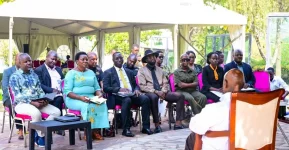President Museveni has approved a new copyright system to protect Ugandan artists. He believes technology should track when someone plays a musician's song and where it happens. The system helps identify when others use creative works for business purposes. Artists deserve payment when their creations generate money for others.
A meeting took place on February 28, 2025, at Rwakitura with Deputy Speaker Thomas Tayebwa, Minister Peace Mutuuzo, and musicians led by Eddy Kenzo. The gathering focused on addressing problems creators face when others profit from their work. The completed system will allow artists to register their works and monitor usage. Musicians can then receive proper compensation from businesses using their content.
Dr. Joel Isabirye from State House explained how musicians will register songs through this new system. Businesses licensed to play music will connect to monitoring equipment that tracks usage. After each month or year, artists collect fees paid by establishments using their music. Bars, hotels, and other venues attract customers partly because they play popular songs.
Radio stations build audiences by broadcasting hits from artists like Sheebah Karungi and Juliana Kanyomozi. These stations earn advertising revenue because listeners tune in to the music. The system ensures creators receive a percentage of the profits their work generates for others. President Museveni recognized this need and directed State House scientists to develop the solution.
Every entertainment venue must install a monitoring chip to receive a business license from the local government. Regular inspections will verify the equipment works properly. If anyone removes the chip, the system immediately detects tampering. The Uganda Communications Commission will identify songs played through connected devices. Police can close establishments that fail to comply with payment requirements.
Due to weak copyright protection, musicians have struggled to benefit fairly from their creations. The new system allocates money based on exactly how often songs play rather than favoring famous performers. For example, if a venue pays one million shillings in license fees, artists receive percentages based on play counts. A song played sixty times earns 600,000 shillings from that location.
The program creates lasting income for performers whose careers have ended. Even retired musicians can earn money when businesses play their older hits. This provides financial security without requiring elderly artists to continue performing. Their families may continue receiving payments for generations as long as venues keep playing those songs.
Dr. Isabirye thanked President Museveni for supporting the copyright management system. He believes it will encourage widespread compliance across Uganda. Multiple agencies, including the Communications Commission, Police, Revenue Authority, and Ministry of Local Government, will collaborate on implementation. The meeting included representatives from the Uganda National Musicians Federation and the State House science team led by Engineer Sheba Kyobutungi.
A meeting took place on February 28, 2025, at Rwakitura with Deputy Speaker Thomas Tayebwa, Minister Peace Mutuuzo, and musicians led by Eddy Kenzo. The gathering focused on addressing problems creators face when others profit from their work. The completed system will allow artists to register their works and monitor usage. Musicians can then receive proper compensation from businesses using their content.
Dr. Joel Isabirye from State House explained how musicians will register songs through this new system. Businesses licensed to play music will connect to monitoring equipment that tracks usage. After each month or year, artists collect fees paid by establishments using their music. Bars, hotels, and other venues attract customers partly because they play popular songs.
Radio stations build audiences by broadcasting hits from artists like Sheebah Karungi and Juliana Kanyomozi. These stations earn advertising revenue because listeners tune in to the music. The system ensures creators receive a percentage of the profits their work generates for others. President Museveni recognized this need and directed State House scientists to develop the solution.
Every entertainment venue must install a monitoring chip to receive a business license from the local government. Regular inspections will verify the equipment works properly. If anyone removes the chip, the system immediately detects tampering. The Uganda Communications Commission will identify songs played through connected devices. Police can close establishments that fail to comply with payment requirements.
Due to weak copyright protection, musicians have struggled to benefit fairly from their creations. The new system allocates money based on exactly how often songs play rather than favoring famous performers. For example, if a venue pays one million shillings in license fees, artists receive percentages based on play counts. A song played sixty times earns 600,000 shillings from that location.
The program creates lasting income for performers whose careers have ended. Even retired musicians can earn money when businesses play their older hits. This provides financial security without requiring elderly artists to continue performing. Their families may continue receiving payments for generations as long as venues keep playing those songs.
Dr. Isabirye thanked President Museveni for supporting the copyright management system. He believes it will encourage widespread compliance across Uganda. Multiple agencies, including the Communications Commission, Police, Revenue Authority, and Ministry of Local Government, will collaborate on implementation. The meeting included representatives from the Uganda National Musicians Federation and the State House science team led by Engineer Sheba Kyobutungi.












